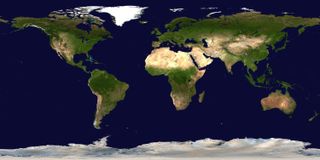What's the World's Largest Continent?

No matter how many continents you count (the old-school way teaches seven, while new methods have six) the biggest of them all is Asia. It spans 17,139,445 square miles – 29.1 percent of Earth’s total land mass — and has a population of 4.1 billion people.
The other commonly recognized continents are Africa, Europe, North America, South America, Antarctica, and Australia.
Continents are generally accepted to be discrete masses of land – like Australia or North America, which is connected by only a tiny strip of land to South America. Some people consider that Europe and Asia are in fact one continent, making it the biggest by far. Another way of differentiating continents is by the underlying plates, which would make Europe and Africa one mass, while the Ural mountains mark the start of the Asiatic plate.
The distinctions can be arbitrary though. Australia is considered a continent, but Greenland (at about one-third the size) is not. Some people argue for even fewer continents. They say that since Europe and Asia are actually part of one great land mass and that Asia and Africa are actually joined by an isthmus (Isthmus of Suez), as are the two Americas (being joined by the Isthmus of Panama), then there should be an Afro-Eurasian continent in addition to one American continent, Antarctica, and Australia.
Hundreds of millions of years ago, today’s continents were huddled in a giant landmass called Pangea.
As Earth’s tectonic plates continue to move, there will likely be changes to the number and size of continents in the future. One projection by physicists shows North and South America drifting apart, and Africa sideways, smooshed into Europe. It looks like change is the only constant when it comes to the continents.
Follow Life's Little Mysteries on Twitter @llmysteries. We're also on Facebook & Google+.
Sign up for the Live Science daily newsletter now
Get the world’s most fascinating discoveries delivered straight to your inbox.
Most Popular



